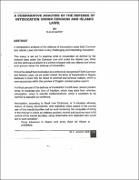| dc.description.abstract | A comparative analysis of the defence of intoxication under both Common and Islamic Laws has been a very challenging and interesting discussion.
This essay is set out to examine what is intoxication as defined by the relevant laws under the Common Law and under the Islamic Law. What are the defences available to a person charged with any offence and where such person raises the defense of intoxication?
It must be stated that intoxication as a defence is recognized in both Common and Islamic Laws ,but as earlier stated,the latter is inapplicable in Nigeria because it could only be raised in criminal and tortuous matters,which is now exclusively within the purview of English criminal justice system.
Acritical perusal of the defence of intoxication in both laws, Islamic positions tends to eradicate any form of injustice, which may arise from voluntary intoxication, which is actually institutionalized, which it considers to be harmful co-existence.
Intoxication, according to Black Law Dictionary, is “a situation whereby reason of taking intoxicants, and individual loses control of the normal use of this mental faculties and as such rendering him incapable of acting in the manner in which an ordinary prudent, normal and cautions man in full control of his mental faculties, using reasonable and expected care would act in such conditions”.
Every intoxicant is Khamr and every (type of ) Khamr is prohibited.The drink prohibited Islam is described as Khamr.Khamra originally means “it intellect and obscures the moral sensibilities of a man .Khamr differently explained as meaning what intoxicates, of the expressed juice of grapes, or the juice of grapes when it has effervesced and the own up froth , and become freed there from ,and still, or it has a common application to intoxicating expressed juice of anything, or any intoxicating thing that clouds or obscures the intellect. | en_US |

